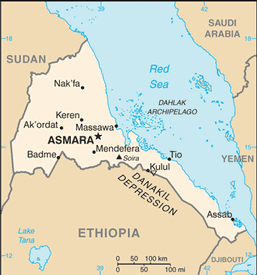With U.S troops withdrawing from Iraq and the fall of Osama bin Laden in 2011, all eyes are now on Eritrea. Eritrea, which means red land or soil, is a small country in the eastern part of the African continent. Before the creation of South Sudan last year, Eritrea was the youngest nation in Africa. So why is Eritrea so important now? Why is the United States foreign policy agenda shifting its focus on this little-known nation?
eastern part of the African continent. Before the creation of South Sudan last year, Eritrea was the youngest nation in Africa. So why is Eritrea so important now? Why is the United States foreign policy agenda shifting its focus on this little-known nation?
As one of its last tasks before the end of 2011, the United Nations (UN) Security Council answered a plea from over a dozen East African nations. They asked the Security Council members to impose economic sanctions on their neighbor, Eritrea. The reason? Allegedly, it has ties to terrorists. Their involvement with these violent groups is creating instability in the region. Alarmed, the U.S along with its fellow member states voted to do so.
With a population of five million, Eritrea holds an important place in U.S. foreign politics as it’s been unofficially labeled a rogue state. Joining the ranks of Iran and neighboring Sudan, Eritrea has been accused of financing, supporting and training terrorists. These are charges that they deny. The U.S also suspects that they are involved with this country’s number one enemy: Al Qaeda. Because of its closeness with Somalia, Eritrea has also supposedly sold arms and other weaponry to militant groups operating out of this destabilizing nearby state.
The fact that this nation is linked with North Korea and placed on the same list as other states like Cuba and Venezuela, known for their rocky relationship with the U.S, should give us a hint. This points to instability that is not only with external stakeholders but also within its borders. What we know of the other countries is that those residing inside are suffering at the hands of those that rule them from the control they exert on everyday life.
However, only organizations like Amnesty International and Human Rights Watch, which has called this country “a giant prison” have brought the problem to light. Is it just that the United Nations and partner states step in only when they feel their security is threatened? How come they have not condemned the regime and its oppressive practices?
What am I referring to? The damaging activities within Eritrea go further than funding militant groups. Eritrea is not only suspected of arms trading and supporting terrorist activities, but also of human rights violations. The country has a record of persecuting religions like Shi’ism, and some Christian groups. Those who disobey and don’t practice government approved religions are arrested, imprisoned and sometimes severely beaten.
The control extends to lack of political freedom which can be seen in that elections have been indefinitely postponed. Freedom of speech and expression are also restricted. According to the BBC, “Eritrea is the only African country to have no privately-owned news media” and not a single [foreign correspondent] now lives in [the capital].” Therefore, all stories shared with the world are vetted by the government.
So I agree that all eyes should be on Eritrea, but maybe for different reasons that those of the UN and the Security Council. I think that we should all be aware of the persecution, the lack of freedoms, the control exerted by the government and the plight of the people. We shouldn’t only have this country on our radar because of their threat to us, but also because together we might be able to help.
To learn more about ways to aid those living in Eritrea, please visit Amnesty International.
Regina Bernadin is a doctoral student at Nova Southeastern University focusing on Conflict Analysis and Resolution. As a SISGI intern, her primary areas of interest are conflict resolution, human rights and Latin American political, economic and socio-cultural issues. Her interest in the development of human rights abroad has taken her to several Latin American countries, including Colombia, Ecuador and Suriname.

